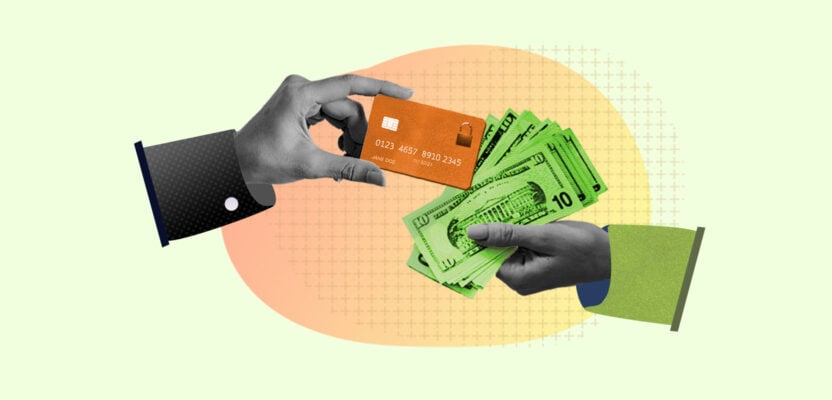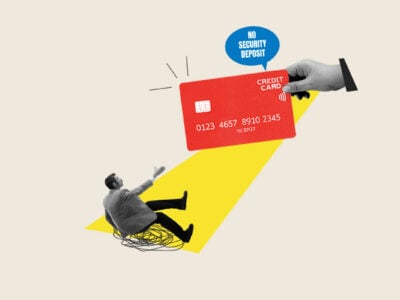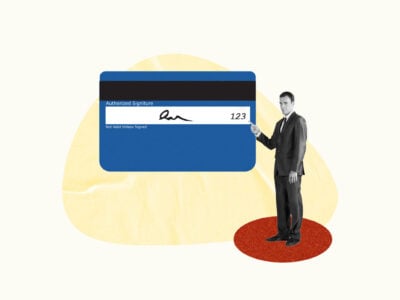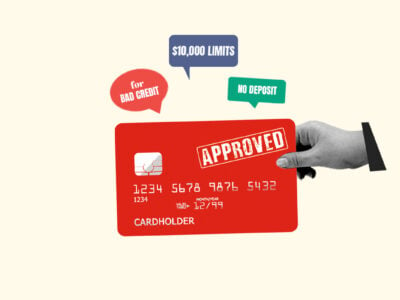You might have noticed that some credit cards ask for a security deposit while others don’t. The ones that do are called secured credit cards. Secured credit cards are available to borrowers with limited or bad credit, but come at a price.
Learn more about what security deposits on credit cards are, how they work, and when you can get your deposit refunded.
Table of Contents
What is a security deposit on a credit card?
A security deposit on a credit card is an amount of money that you have to pay when you open the card. The deposit will serve as “collateral,” which means the credit card company will keep it if you default on your payments.
Secured credit cards—those that charge security deposits—are available to unproven or high-risk borrowers who might not be able to get normal (“unsecured”) credit cards.
Most security deposits are refundable, though some are not. If you’re shopping for a secured credit card, look out for the terms “refundable security deposit” so you know there’s a chance of getting your money back.
A secured card’s security deposit usually determines its initial credit limit. For example, if you put down a security deposit of $300, you’ll receive a card with $300 of available credit. In most cases, you can request a higher credit limit by adding funds to your security deposit.
What is the minimum deposit for a secured credit card?
Minimum security deposits vary by credit card, but they usually fall between $200–$2,000. 1 However, security deposits can be as low as $49, like on the Capital One Platinum Secured credit card.
How to make a deposit on a secured credit card
You’ll need to put down your security deposit on a secured credit card before the card is issued. Your card issuer will ask you for your deposit at one of two points in the process:
- Right before your application is approved: Many card companies require a security deposit to be made as the final step in the credit card application process. After you’ve completed your application and given your personal details, you may be asked to make a deposit before card approval. After the deposit is verified, you’ll likely receive automatic approval and be given the details of your new card (like the APR and credit limit) before it arrives in the mail.
- After approval: Some credit card issuers will first approve your card application and then ask for your security deposit before sending you the physical card.
In both the above scenarios, you’ll likely be asked to select your desired credit limit and put down a corresponding security deposit. Ensure you have enough funds in your bank account to make the deposit via bank transfer or debit when you apply for your card.
You may be charged additional fees on top of your deposit, like application or processing fees. However, your card issuer should make this clear to you ahead of time, so you can avoid applying to cards that charge more than you’re willing to pay.
Once you pay your deposit and the credit card company receives it, they’ll issue your card and send it in the mail. When you get your card, activate it by calling the number on the back, then use it as you would any other credit card.
When do I get my secured credit card deposit back?
There are two times when you can get your credit card security deposit back:
- When you close your account: If you close your secured credit card account, you’ll receive your security deposit back after you repay your balance in full.
- When you upgrade to a secured card: Many credit card companies allow you to upgrade from a secured card to an unsecured card. Your credit card issuer may offer you this transition automatically after 6 months to a year of responsible card use, or you may need to request an upgrade. Once you successfully upgrade your card, your card issuer will refund your security deposit to your account.
When won’t you get your security deposit back?
Getting your deposit back isn’t guaranteed. There are two circumstances in which it won’t happen:
- Your card doesn’t offer refunds: Unfortunately, not all secured credit cards refund your security deposit. If your security deposit is nonrefundable, your card issuer will keep it, even if you close your account in good standing.
- You default on your debt: If you default on your credit card bill (meaning you fail to pay it back), your card issuer will keep your deposit to make up for their losses. They’ll also probably forcibly close your account.
Make sure you read your card’s terms and conditions before putting down your deposit so you know whether you can get it refunded and what conditions you need to meet to get your money back.
How secured credit cards can help you build your credit
Getting a secured credit card is a great way to either build credit for the first time or rebuild damaged credit.
One of the fastest ways to improve your credit score is to show responsible borrowing by regularly using and paying off a credit card. Because you can get secured cards regardless of your current credit score, they’re great tools to do this. Just be sure to pay off your balance on time every month.
To track your credit-building progress, you can get free credit reports from the three major credit bureaus at AnnualCreditReport.com.
Once your credit score has improved from responsibly using your secured card, you can qualify for an upgrade to an unsecured card from the same issuer or start looking for other credit cards. Once you have a good credit score, you can qualify for more favorable cards, like those with lower APRs or that offer cashback rewards or credit card miles.
Should I get a secured credit card?
You should consider getting a secured credit card if:
- You have bad credit or a limited borrowing history (which means you won’t qualify for most unsecured cards)
- You can afford the required security deposit
If you don’t want to pay a security deposit but are worried about qualifying for other credit cards, consider your options among:






